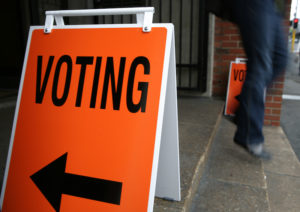
DOJ re-examines the legality of including a citizenship question on the 2020 census, President Trump signs a bill protecting taxpayers’ rights, and more…
IN THE NEWS
- After attorneys for the U.S. Department of Justice (DOJ) told a federal court on Tuesday that the Census Bureau will be printing the 2020 census without a citizenship question, they told the court on Wednesday that they will be re-examining whether there is a way to include a citizenship question on the 2020 census. Following the initial announcement in the wake of the U.S. Supreme Court’s ruling that the U.S. Department of Commerce failed to support its decision to include a citizenship question with a genuine rationale, President Donald J. Trump refuted that announcement, tweeting, “We are absolutely moving forward, as we must, because of the importance of the answer to this question.” Following President Trump’s tweet, senior DOJ officials informed a federal district court judge that the Justice Department will evaluate whether there is a “legally available path under the Supreme Court’s decision” to include the citizenship question.
- President Trump signed into law a bill that requires the Internal Revenue Service (IRS) to increase protection of taxpayers’ rights during the enforcement process. The bill originally contained a controversial provision that would have prevented the IRS from creating a free public filing service to compete with private tax companies, a provision which Congress voted to remove after backlash. Rep. Richard Neal (D-Mass.) stated that the bill was a bipartisan process “to implement pro-taxpayer reforms at the IRS for the first time in more than 20 years.”
- The U.S. District Court for the Western District of Washington struck down an order by U.S. Attorney General William Barr that would have allowed asylum applicants to be detained indefinitely without a bond hearing. U.S. District Judge Marsha Pechman ruled that the order violated asylum applicants’ constitutional right to due process, noting that the “Supreme Court has definitively established the immigrant detainees’ constitutionally-protected interest in freedom from unnecessary incarceration.” White House Press Secretary Stephanie Grisham responded that the decision was “at war with the rule of law” and claimed that it “will lead to the further overwhelming of our immigration system by illegal aliens.”
- The DOJ’s Executive Office for Immigration Review (EOIR) issued a final rule broadening the Attorney General’s power to determine which Board of Immigration Appeals decisions become binding law. Previously, the Attorney General could only designate decisions as binding after extensive briefing and issuance of a written final decision. EOIR’s new rule eliminates these procedures. EOIR proposed the rule in 2008 but did not finalize it until this week.
- The U.S. House of Representatives passed an election security bill that requires all voting systems to use more durable paper ballots, allow voters to inspect and verify their marked ballots before casting, and provide accommodations for voters with disabilities. “We must do all we can to ensure they truly represent the will of the people,” stated the bill’s sponsor, Rep. Zoe Lofgren (D-Cal.). Rep. Rodney Davis (R-Ill.) reportedly said, “mandating the exclusive use of paper ballots will create longer lines at polling places and can be lost, destroyed or manipulated far easier than electronic voting machines with a paper trail backup.”
- Eleven state attorneys general filed a lawsuit against the U.S. Environmental Protection Agency (EPA) for an alleged failure to regulate adequately the import and use of asbestos as required by the Toxic Substances Control Act. In April, EPA finalized a rule that limited use of asbestos but also included reporting exemptions for naturally-occurring asbestos and asbestos-containing products. The states that filed this new action petitioned EPA to remove these exemptions prior to the final rule’s publication, but that petition was denied. The states’ lawsuit asserts that this denial was “arbitrary, capricious, and not in accordance with law.”
- A group of more than 200 major U.S. companies submitted a brief in support of the plaintiffs in three employment discrimination cases due to be considered by the Supreme Court next term, arguing that Title VII of the Civil Rights Act of 1964—which prohibits sex-based employment discrimination—should be interpreted to include discrimination against LGBTQ people. Citing “extensive social-science and economic research,” the brief argued that excluding sexual orientation and gender identity from protection under Title VII would have “wide-ranging, negative consequences for businesses, their employees and the U.S. economy.” Erin Uritus, CEO of Out & Equal Workplace Advocates, stated that the brief “exposes the lie that affirming civil rights protections for LGBTQ Americans is somehow anti-business.”
- The Office of the U.S. Trade Representative issued a proposal to place additional tariffs on the European Union for certain items in response to large subsidies placed on civil aircrafts. The new list of the supplemental items would total about $4 billion, on top of the $21 billion in tariffs for items proposed in April. The written comment period on the proposal closes August 5.
- The Council of the District of Columbia expressed its disapproval of the use of tanks as part of President Trump’s plans for Washington, D.C.’s Independence Day celebration. The Council referenced a November 2018 U.S. Department of Defense memorandum establishing guidelines for the Washington Veterans Day parade, indicating it should include “wheeled vehicles only, no tanks” out of a desire to “minimize damage to local infrastructure.” D.C. Mayor Muriel Bowser reportedly expressed similar concerns for “the impact on the city, the impact on safety, the impact on pulling personnel, the impact on our roadways, and quite frankly, the attention it would attract.”
WHAT WE’RE READING THIS WEEK
- Desen Lin, a Ph.D. candidate in the Economics Department at the University of Pennsylvania, and Susan Wachter, a professor at the Wharton School of the University of Pennsylvania, developed a model to demonstrate the effect housing regulations have on the housing market. Land use regulations, according to their model, increase housing prices and create a spillover effect into neighboring communities. The spillover effect, as defined by Lin and Wachter, reveals an increased demand for housing in communities that neighbor regulated ones.
- Changes to U.S. securities regulations could shift energy investment trends away from fossil fuels, according to an article in the Indiana Law Journal. Hari M. Osofsky of Penn State Law School, Jacqueline Peel and Anita Foerster of Australia’s University of Melbourne Law School, and Brett McDonnell of University of Minnesota Law School argued that current fossil fuel divestment strategies fail to encourage sufficient reinvestment in clean energy technology. The authors concluded that a combination of new rules on investment crowdfunding and proposals to expand state corporation law to permit benefit corporations would increase investment in clean energy.
- Article II of the U.S. Constitution vests the “executive power” in the President. In an article for the Columbia Law Review, professor Julian Davis Mortenson of University of Michigan Law School argued that this provision was understood by the founders to be an “empty vessel,” merely allowing the President to carry out “projects defined by a prior exercise of the legislative power.” Mortenson concluded that Article II does not grant the President broad authority to act independently of congressional authorization in the arenas of national security and foreign affairs.



